Just In
- 1 hr ago

- 1 hr ago

- 3 hrs ago

- 4 hrs ago

Don't Miss
- News
 Massive Landslide Blocks Arunachal Pradesh's Dibang Valley Road Near Indo-China Border
Massive Landslide Blocks Arunachal Pradesh's Dibang Valley Road Near Indo-China Border - Sports
 103 Not Out: S Ramdas - 103-year-old CSK fan fondly called 'Senior Valiban' - aspires to meet MS Dhoni
103 Not Out: S Ramdas - 103-year-old CSK fan fondly called 'Senior Valiban' - aspires to meet MS Dhoni - Automobiles
 2024 Jeep Wrangler Facelift Review - Off-Road Specialist Gets Easier To Live With
2024 Jeep Wrangler Facelift Review - Off-Road Specialist Gets Easier To Live With - Education
 CBSE Board Result 2024 expected to release soon: Know When and How to Check CBSE 10th & 12th Results
CBSE Board Result 2024 expected to release soon: Know When and How to Check CBSE 10th & 12th Results - Finance
 Rs 44,000 Crore M-Cap Lost, Stock Falls 10%, No More 4th Largest Bank; How RBI's Ban Rocked Kotak
Rs 44,000 Crore M-Cap Lost, Stock Falls 10%, No More 4th Largest Bank; How RBI's Ban Rocked Kotak - Movies
 Idi Minnal Kadhal OTT Release Date And Platform: When And Where To Watch Ciby And Bhavya Trikha's Movie
Idi Minnal Kadhal OTT Release Date And Platform: When And Where To Watch Ciby And Bhavya Trikha's Movie - Technology
 Garena Free Fire Max Redeem Codes for April 25, 2024: Get Access to the Latest Freebies in the Game
Garena Free Fire Max Redeem Codes for April 25, 2024: Get Access to the Latest Freebies in the Game - Travel
 Escape to Kalimpong, Gangtok, and Darjeeling with IRCTC's Tour Package; Check Itinerary
Escape to Kalimpong, Gangtok, and Darjeeling with IRCTC's Tour Package; Check Itinerary
Swami Vivekananda Delivered Historic Speech In Chicago On This Day In 1893
Swami Vivekananda was the man who took the Vedanta philosophy to the West and reformed Hinduism drastically. Born on January 12, 1863, now we celebrate this birth anniversary as National Youth Day, to honour him.
He travelled to the USA to attend the World Parliament of Religions in Chicago, in spite of being almost a pauper. He revolutionised the Orient philosophy and persuaded the West to accept that the Hindu philosophy is far more superior than others.
Swami Vivekananda was born as Narendra Nath Dutta in an aristocratic Bengali family in Calcutta. Vivekananda toured entire India and worked towards the upliftment of the poor and needy. He founded the famous Ramakrishna Mission and Belur Math in Calcutta that still dedicatedly works towards popularising Hinduism and helping the needy.
This day, 127 years ago, Swami Vivekananda delivered historic speech at the World Parliament of Religions, Chicago.
— विश्व हिंदू परिषद छत्तीसगढ़ (@cgvhp1) September 11, 2020
"I'm proud to belong to a religion which has taught the World both Tolerance and Universal Acceptance".#VivekanandInChicago @vskchhattisgarh pic.twitter.com/w89Pvx7qRk
The full text of Swami Vivekananda's speech at the Parliament of Religion, Chicago in 1893
It fills my heart with joy unspeakable to rise in response to the warm and cordial welcome which you have given us. I thank you in the name of the most ancient order of monks in the world; I thank you in the name of the mother of religions, and I thank you in the name of millions and millions of Hindu people of all classes and sects.
My thanks, also, to some of the speakers on this platform who, referring to the delegates from the Orient, have told you that these men from far-off nations may well claim the honour of bearing to different lands the idea of toleration. I am proud to belong to a religion which has taught the world both tolerance and universal acceptance. We believe not only in universal toleration, but we accept all religions as true. I am proud to belong to a nation which has sheltered the persecuted and the refugees of all religions and all nations of the earth. I am proud to tell you that we have gathered in our bosom the purest remnant of the Israelites, who came to Southern India and took refuge with us in the very year in which their holy temple was shattered to pieces by Roman tyranny. I am proud to belong to the religion which has sheltered and is still fostering the remnant of the grand Zoroastrian nation. I will quote to you, brethren, a few lines from a hymn which I remember to have repeated from my earliest boyhood, which is every day repeated by millions of human beings: "As the different streams having their sources in different paths which men take through different tendencies, various though they appear, crooked or straight, all lead to Thee."
The present convention, which is one of the most august assemblies ever held, is in itself a vindication, a declaration to the world of the wonderful doctrine preached in the Gita: "Whosoever comes to Me, through whatsoever form, I reach him; all men are struggling through paths which in the end lead to me." Sectarianism, bigotry, and its horrible descendant, fanaticism, have long possessed this beautiful earth. They have filled the earth with violence, drenched it often and often with human blood, destroyed civilization and sent whole nations to despair. Had it not been for these horrible demons, human society would be far more advanced than it is now. But their time is come; and I fervently hope that the bell that tolled this morning in honour of this convention may be the death-knell of all fanaticism, of all persecutions with the sword or with the pen, and of all uncharitable feelings between persons wending their way to the same goal.
Address at the final session
Chicago, September 27, 1893
The World's Parliament of Religions has become an accomplished fact, and the merciful Father has helped those who laboured to bring it into existence and crowned with success their most unselfish labour.
My thanks to those noble souls whose large hearts and love of truth first dreamed this wonderful dream and then realized it.
My thanks to the shower of liberal sentiments that has overflowed this platform. My thanks to this enlightened audience for their uniform kindness to me and for their appreciation of every thought that tends to smooth the friction of religions. A few jarring notes were heard from time to time in this harmony. My special thanks to them, for they have, by their striking contrast, made general harmony the sweeter.
Much has been said of the common ground of religious unity. I am not going just now to venture my own theory. But if anyone here hopes that this unity will come by the triumph of any one of the religions and the destruction of the others, to him I say, "Brother, yours is an impossible hope." Do I wish that the Christian would become Hindu? God forbid. Do I wish that the Hindu or Buddhist would become Christian? God forbid.
The seed is put in the ground, and earth and air and water are placed around it. Does the seed become the earth, or the air, or the water? No. It becomes a plant. It develops after the law of its own growth, assimilates the air, the earth, and the water, converts them into plant substance, and grows into a plant.
Similar is the case with religion. The Christian is not to become a Hindu or a Buddhist, nor a Hindu or a Buddhist to become a Christian. But each must assimilate the spirit of the others and yet preserve his individuality and grow according to his own law of growth.
If the Parliament of Religions has shown anything to the world, it is this: It has proved to the world that holiness, purity and charity are not the exclusive possessions of any church in the world and that every system has produced men and women of the most exalted character. In the face of this evidence, if anybody dreams of the exclusive survival of his own religion and the destruction of the others, I pity him from the bottom of my heart, and point out to him that upon the banner of every religion will soon be written in spite of resistance: "Help and not fight," "Assimilation and not Destruction," "Harmony and Peace and not Dissension."
(Source: PIB)
SWAMI VIVEKANANDA: A SHORT BIOGRAPHY
Swami Vivekananda was a man of great charisma. His address at the Chicago Parliament of Religions is a classic masterpiece which put India into the top list of countries where spirituality still thrives. He was an active participant in the Indian freedom struggle against the British. His charisma provoked the youth to rise to the call of the nation and do their duty to the country. But how much do we know the actual Swami Vivekananda? Not much.
So, here are 10 rare facts about Swami Vivekananda which is sure to blow your mind.
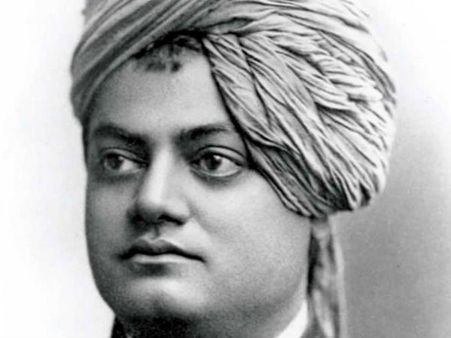
Vivekananda Was An Average Student
The world knows him for his eloquent speeches. But did you know that as a student, Swami Vivekananda was just average? He scored only 47 percent at the University entrance level examination, 46 percent in the FA (later this exam became Intermediate Arts or IA) and 56 percent in his BA exam.
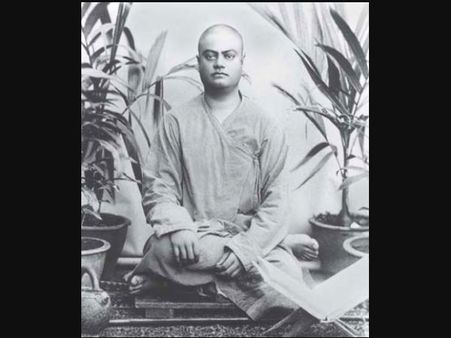
Vivekananda Was An Acquired Name
Swami Vivekananda was the name he took up after he became a monk. Originally, he was named as Vireshwara by his mother and was often referred to as 'Biley'. Later, he was named Narendra Nath Dutta.
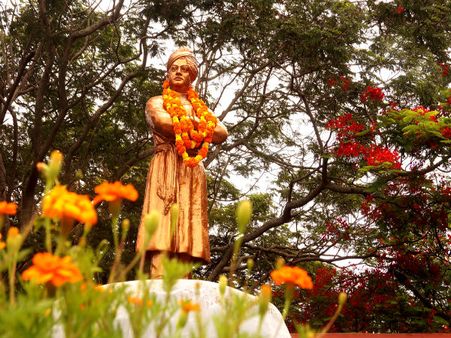
Vivekananda Never Got A Job
In spite of having a BA degree, Swami Vivekananda had to go from door to door in search of a job. He had almost turned an atheist as his belief in God was shaken.
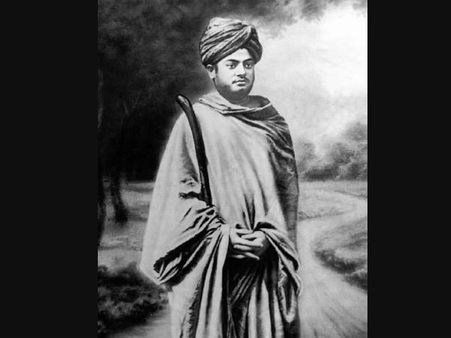
Swamiji's Family Lived In Extreme Poverty
After the death of his father, Swamiji's family lived in extreme poverty. His mother and sisters had to struggle hard to get a meal a day. Often, Swamiji went without food for days together so that others in the family had enough.

A Guarded Secret
The Maharaja of Khetri, Ajit Singh, used to send 100 rupees to Swamiji's mother on a regular basis to help her cope with the financial problems. This arrangement was a closely guarded secret.
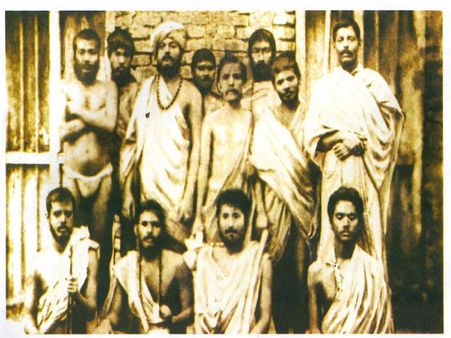
Vivekananda's Love For Tea
Vivekananda was a connoisseur of tea. In those days, when the Hindu pandits were opposed to drinking tea, he introduced tea into his monastery.
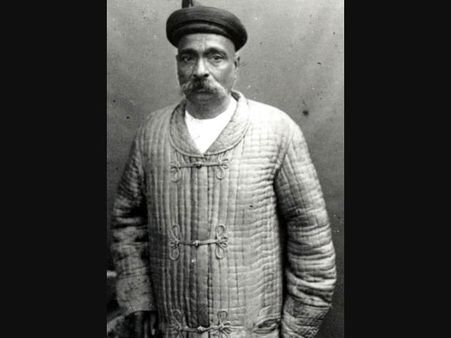
Swami & The Lokmanya
Swamiji once persuaded Lokmanya Bal Gangadhar Tilak to make tea at Belur Math. The great freedom fighter brought nutmeg, mace, cardamom, cloves and saffron with him and prepared Mughlai tea for all.

He Never Completely Trusted Ramakrishna
Ramakrishna Paramahansa was the guru of Swami Vivekananda. During the initial days of learning with his teacher, Vivekananda never completely trusted him. He kept on testing Ramakrishna for everything that he said until he finally got all his answers.
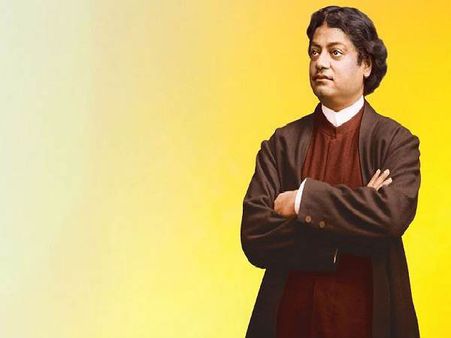
Swamiji Predicted His Own Death
It was to French operatic soprano Rosa Emma Calvet that Vivekananda had declared in Egypt that he would die on July 4. He passed away on July 4th, 1902.
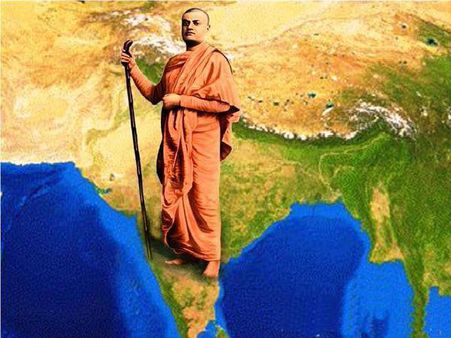
Swamiji Had 31 Ailments Before He Passed Away
According to the book ‘The Monk as Man' by renowned Bengali writer Shankar, Swami Vivekananda suffered from 31 ailments. The books lists insomnia, liver and kidney disease, malaria, migraine, diabetes and heart ailments as some of the 31 health problems that Vivekanand faced in the course of his life. He even suffered from asthma which got unbearable many times.
-
 insyncNational Youth Day 2024: Swami Vivekananda's Quotes, Wishes That Inspire Us To Embrace Inner Strength
insyncNational Youth Day 2024: Swami Vivekananda's Quotes, Wishes That Inspire Us To Embrace Inner Strength -
 yoga spiritualityHow To Face Your Fears? Overcome Your Fears In Life Swami Vivekananda’s Way!
yoga spiritualityHow To Face Your Fears? Overcome Your Fears In Life Swami Vivekananda’s Way! -
 faith mysticismSwami Vivekanandas Invaluable Advice That Continues To Inspire Students Even Today
faith mysticismSwami Vivekanandas Invaluable Advice That Continues To Inspire Students Even Today -
 lifeNational Youth Day 2023: Leaders Across India Share Vision For Youths To Drive Change
lifeNational Youth Day 2023: Leaders Across India Share Vision For Youths To Drive Change -
 faith mysticismSwami Vivekananda Jayanti 2023: Three Anecdotes From Swami Vivekananda’s Childhood
faith mysticismSwami Vivekananda Jayanti 2023: Three Anecdotes From Swami Vivekananda’s Childhood -
 faith mysticismGayatri Mantra Lyrics And Meaning In English And Sanskrit
faith mysticismGayatri Mantra Lyrics And Meaning In English And Sanskrit -
 faith mysticismNational Youth Day 2023: 12 Inspiring Swami Vivekananda's Quotes On His Birthday
faith mysticismNational Youth Day 2023: 12 Inspiring Swami Vivekananda's Quotes On His Birthday -
 sri ramakrishnaThe Wonder that was Sri RamakrishnaParamahamsa’s Touch-Part II
sri ramakrishnaThe Wonder that was Sri RamakrishnaParamahamsa’s Touch-Part II -
 sri ramakrishnaThe Wonder that was Sri RamakrishnaParamahamsa’s Touch
sri ramakrishnaThe Wonder that was Sri RamakrishnaParamahamsa’s Touch -
 anecdotesOn Swami Vivekananda's Birthday, Let's Learn About Interesting Incidents Of His Life
anecdotesOn Swami Vivekananda's Birthday, Let's Learn About Interesting Incidents Of His Life -
 sri ramakrishnaSri Ramakrishna's Smile-Cheerfulness In Spirituality
sri ramakrishnaSri Ramakrishna's Smile-Cheerfulness In Spirituality -
 anecdotesSwami Vivekananda's Short Story Will Inspire You To Understand The Meaning Of True Worth
anecdotesSwami Vivekananda's Short Story Will Inspire You To Understand The Meaning Of True Worth


 Click it and Unblock the Notifications
Click it and Unblock the Notifications



